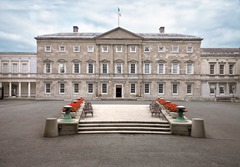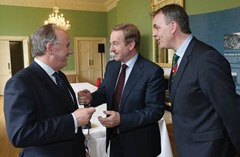Oireachtas round-up
 A month of crisis was interspersed with thoughtful debates on social care, sport and balance in the media during April’s proceedings.
A month of crisis was interspersed with thoughtful debates on social care, sport and balance in the media during April’s proceedings.
The Garda tapes crisis dominated the political and media agenda as April began but members also gave considerable attention to the Ukraine crisis and its implications for the future of Europe.
Micheál Martin raised the first controversy at leaders’ questions on 1 April. For older TDs, this probably brought back memories of 1983 when another Garda Commissioner, Patrick McLaughlin, also resigned over phone tapping.
Martin found the Taoiseach’s explanation of the sequence of events “difficult to comprehend.” It was obvious to him that the officials would have informed Alan Shatter about the Commissioner’s letter, which had been received two weeks previously.
It was also “incredible” that the Secretary General would have told the Commissioner that the Cabinet “were unhappy about this” even though the Cabinet had apparently not been briefed. The Taoiseach added that the letter was sent to the Secretary General with the intention that the Minister “should be informed.”
A no confidence motion, from Fianna Fáil’s Niall Collins, was quickly presented and debate continued the next morning. “The Garda Commissioner was shafted to save the Minister’s skin,” Collins stated bluntly. “It is as simple as that. We must hear from the Taoiseach and we must have real leadership.”
Shatter was strongly supported by Fine Gael TDs with Michael Noonan summing up the defence. “Most of the difficulties in the justice area in recent months arose from incidents that occurred when Fianna Fáil was in office,” he remarked. “In this respect, Fianna Fáil has performed a major conjuring trick through which the people who caused the mess are blameless and the man who is cleaning it up is supposed to be at fault.”
The Government’s counter-motion was passed by 95 votes to 51.
During a debate on homelessness on 3 April, independent Catherine Byrne noted the need to “examine the reasons behind why people become homeless, such as poverty, unemployment and family disputes.” She added: “We also need to put names and faces on the people entering into homelessness in our society to find out who they are, where they come from, and their needs.”
The Ukrainian Ambassador, Sergii Reva, looked on as TDs debated the crisis in his country and Paschal Donohoe acknowledged its distant nature.
“Why should Ireland be concerned about developments many thousands of miles away from here with all the other challenges and needs that our people have?” he stated. “We have a track record of absolute insistence that the rule of law is the fundamental bedrock and guarantor of stability in the international system.”
Sinn Féin’s Seán Crowe noted that the interim Ukrainian Government has “very little legitimacy” and condemned the “political, economic and military interference” by the USA and EU as well as Russia. He also highlighted that the new administration included the far-right Svoboda party.
 While Crowe preferred neutrality and non-interference, Reform Alliance Senator Paul Bradford called for a “serious and tough” response from the West. He pointed back to the “dark visions from 1930s Europe” and added that Reagan and Thatcher would have responded more firmly than current leaders.
While Crowe preferred neutrality and non-interference, Reform Alliance Senator Paul Bradford called for a “serious and tough” response from the West. He pointed back to the “dark visions from 1930s Europe” and added that Reagan and Thatcher would have responded more firmly than current leaders.
Stephen Donnelly’s Broadcasting (Amendment) Bill sought to protect journalists from the “chilling effect” of complaints about offence being caused.
“Each extreme in a debate is trying to exclude the other side and control how RTÉ covers stories,” he warned. “The risk is that in giving in to this we will lose fresh, unheard and unique voices. Instead, we will hear again and again from the same tired, tried and tested contributors who have been briefed, rehearsed and sanitised.”
The Bill fell at its second stage on 15 April, with 44 votes in favour and 76 against.
Senators, meanwhile, unanimously backed Terry Brennan’s call on the Government to make Ireland an “internationally recognised destination for competitions in as many sports as possible,” including the rugby and golf world cups. Brennan is Fine Gael’s tourism and sport spokesman in the Seanad.
In another debate, Fianna Fáil’s Brian Ó Domhnaill called for a comprehensive cost-benefit analysis of support for wind farms. “I am appalled that any government would, following a period of public consultation, employ consultants to analyse the recommendations made by the public,” he said, referring to views from the Midlands. “Is the feedback not strong enough?”
Marie-Louise O’Donnell asked the Government to consider a wide-ranging bereavement policy to help families deal better with the legal, financial and practical aspects of loss. A sensitive debate followed, with Minister of State Kathleen Lynch thanking senators for raising the issue.
The presidential signature enacted three bills during the month. The Electoral (Amendment) Act 2014 (see box) lifts a bar on bankrupt parliamentarians. The Oireachtas (Ministerial and Parliamentary Offices) (Amendment) Act reduces allowances for parliamentary party leaders by 10 per cent and abolishes severance payments for some ministerial and parliamentary offices.
The Fines (Payment and Recovery) Act, meanwhile, allows all fines of more than €100 to be paid by instalments and is expected to reduce the number of arrests for fine default.
The Dáil returned from its Easter recess on 30 April while the Seanad recess continues to 7 May.





